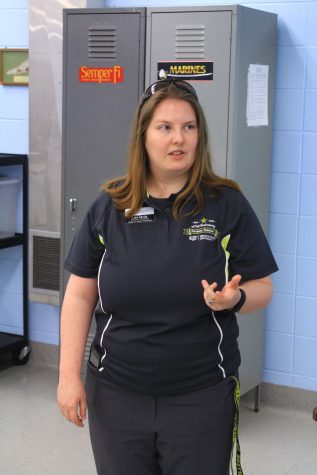Shockers donate blood, compassion for humanity
American Red Cross collections technician Debi Goodner prepares Wichita State graduate student Jamie Stephens’s arm for a blood donation at the American Red Cross blood drive Tuesday.
Wichita State freshman Miranda Miller did not hesitate to visit the Harvest room of the Rhatigan Student Center Tuesday afternoon after hearing that campus had a visiting organization — one that she had worked with many times before.
As part of a two-day effort — with the first stop at the west campus — the American Red Cross visited WSU Monday and Tuesday, hosting blood drives for students, faculty and community members.
Attracting a wide range of visitors, the Red Cross’ blood drive stayed busy throughout the afternoon, with a queue of patrons waiting for their bed and an opportunity to give.
“I have given blood about six times now,” Miller said. I” have always done really well, never been dizzy.”
Miller said she has been giving blood since she was a student at her high school in Emporia, but has also had first-hand experience with the effects of blood donations.
“I needed a [blood] transfusion several years ago — I stopped eating meat as a health thing and my iron levels dropped really low,” she said. “And they didn’t have any blood to give to me.”
According to the American Red Cross, someone in the U.S. needs blood every two seconds, and more than 41,000 blood donations are needed every day. Not only that, but, “a total of 30 million blood components are transfused each year in the U.S.”
During the winter months, blood donations typically are down, as bad weather and illness affect the collection process. Since 1970, January is marked as National Blood Donor Month, celebrating those who are able to donate extra blood.
At the RSC, though, the Red Cross’ efforts to scout out both new and returning blood donors did not fall on deaf ears, with the Harvest Room bustling with the sounds of medical equipment and soft conversations between donors and officials all afternoon.
“When I donated towards the end of November, there was not a whole lot of people,” senior Danielle Buethe said. “But this is the most [donors] I have seen,”
Much like Miller, Buethe is no stranger to blood donation — she donates every 56 days, and has done so since she was 16 years old.
She estimates that her donation yesterday was her 13th time donating. Although she does not have any direct history with transfusions herself, she, like some other college students, donates to help others.
“Just knowing that I could give blood to somebody who needs it, when I have extra,” Buethe said.
The American Red Cross said that it hosts over 9,000 blood drives on university campuses a year, with over 3,000 students assisting with the drives. Not only that, but between August of 2013 and July of 2014, a total of 289,367 individuals donated blood on a college campus, totaling 369,608 units of blood, with roughly one pint given during a donation.
One pint of blood can save up to three lives, with 5 million patients in the U.S. requiring blood transfusions a year.
“One car accident victim could need up to 100 blood donations,” said Jessica Schinstock, American Red Cross donor recruitment representative for the South Central Kansas Region. “We are just trying to maintain the blood supply throughout the country.”
Humans are characterized as having different blood types, with variations of type A, type B and type O blood making up the liquid flowing through their veins. Each type is distinguished by the antigens and antibodies attached to the blood cells.
As a result of this, not all blood is compatible with each other — unless an individual possesses type O blood, which is regarded as being “universal,” due to the lack of antigens on the blood cells.
Individuals who have blood types other than O generally can accept type O blood, making those like graduate student Jamie Stephens a favorite in health circles.
“Type O is the universal donor. Any other blood type can receive my blood, since it doesn’t have any antigens on it,” Stephens said.
A former nurse, Stephens has said she witnessed the effects of a blood transfusion, and has watched others receive type O blood, just like the blood she possesses.
Stephens is also a repeat donor, realizing the power of the blood she has.
“I don’t donate every time they call me, but I probably donate about three times a year, because I am type O,” she said.
The Red Cross stressed the importance of blood donors — even those who are college students, as they make up a significant portion of donors.
“Twenty percent of total donations to the Red Cross are given by high school and college students,” said Jan Hale, communications manager for the Central Plains Blood Services Region of the Red Cross. “You guys are extremely important to collections.”
For more information about donating blood, call the American Red Cross at 1-800-733-2767 or visit redcrossblood.org to schedule a donation or appointment at the American Red Cross Wichita Blood Donor Center.

Kristy Mace is the photo editor for The Sunflower. She's majoring in psychology. Currently a junior, Mace hopes to go on to get her Ph.D. and become a...










